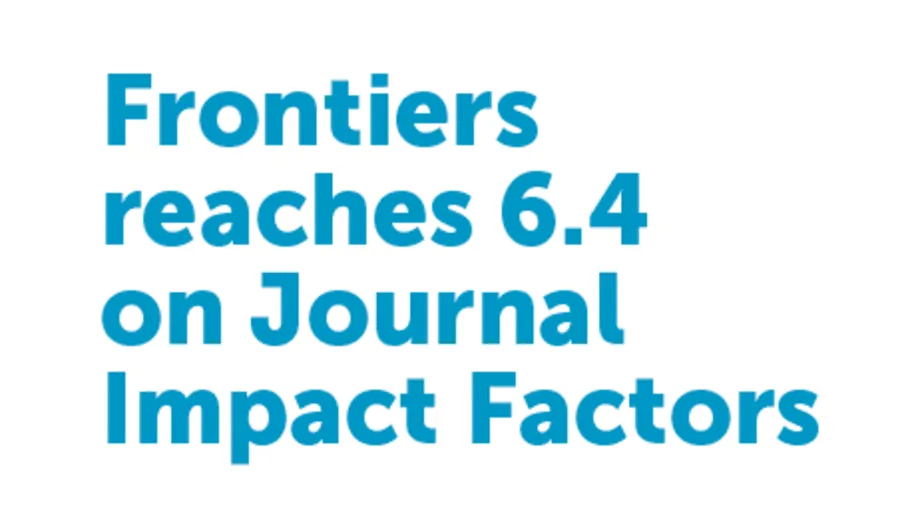
- Science news
- Impact analysis
- Quality and Impact Analysis: Frontiers in Microbiology
Quality and Impact Analysis: Frontiers in Microbiology
By Pascal Rocha da Silva, Frontiers analyst
Frontiers in Microbiology was launched in 2010. In just 4 years, it has become the 5th largest and the 12th most-cited Microbiology journal in the world.
The Impact Factor (IF), defined as the total number of citations in a given year divided by the number of citable articles over the previous two-year period, is the most commonly accepted metric of journal quality (but not of an individual paper or researcher). It was formally established by the Institute for Scientific Information (ISI) in 1975. As the IF can be heavily skewed by a few highly-cited papers, total citations generated over the same two-year period provide a more accurate indication of the overall influence or impact of the articles published by a journal in a field. Frontiers is a pioneer in the use of article-level and author-level metrics and encourages every author to use these to track the development of his or her readership on a more granular level. d.
Analysis within the category of Microbiology
There are 119 journals listed in the category of Microbiology in the 2014 Journal Citations Reports (JCR) provided by Thomson Reuters in 2015. Frontiers in Microbiology is one of the 15 Gold open-access journals.
Below, the results of our comparative analysis on the article volume published, impact factor (IF) achieved and the total number of citations achieved in 2014 based on articles published over the two preceding years, 2012 and 2013. (Click here to see the volume and number of citations of other Frontiers journals).
Comparison of impact factors and volume among all open-access journals (15) in Microbiology

Figure 1. Frontiers in Microbiology compared to 15 open-access journals listed the Microbiology JCR category. The journal analysis is based on the 2014 Journal Citations Reports published by Thomson Reuters, 2015.
Comparison of impact factors and volume among all journals (119) in Microbiology

Figure 2. Frontiers in Microbiology compared to all 119 journals (subscription and open access) listed in the Microbiology JCR category. The journal analysis is based on the 2014 Journal Citations Reports published by Thomson Reuters, 2015.
Comparison of total citations in 2014 for articles published in the previous two years among all journals (119) in Microbiology

Figure 3. Top 20 most-cited journals in Microbiology in 2014 (citations in 2014 were counted for articles published in 2012 and 2013) in the Microbiology JCR category. The journal analysis is based on the 2014 Journal Citations Reports published by Thomson Reuters, 2015.
Summary
Amongst the 15 Gold open-access journals listed in the categories of Microbiology, Frontiers in Microbiology:
Ranks 3rd on impact factor – 58% higher than the average for Microbiology
Is the 2nd largest open-access journal in Microbiology – 4 times larger than the average article volume in open-access journals in Microbiology
Amongst all of the 119 journals listed in the category of Microbiology, Frontiers in Microbiology:
Is in the top 23% on impact factor – 18% higher than the average for Microbiology
Is the world’s 5th largest Microbiology journal overall – 4 times larger than the average article volume in all journals in Microbiology
Is the 12th most-cited journal in 2014 based on articles published in 2012 and 2013
In summary, Frontiers in Microbiology, one of the youngest journals publishing peer-reviewed scholarly articles in Microbiology, has become the 5th largest and 12th most-cited journal in Microbiology with an impact factor in the top 23%.
Further significance
The results are more significant if one considers:
Frontiers does not engineer the IF by setting a rejection rate, and instead operates an impact neutral peer-review process.
The impact factor of Frontiers in Microbiology has been increasing from 3.941 in 2013 to 3.989 in 2014 JCR, despite an increase of 24% in volume over the period. This defies the long-held belief that publishing high volumes reduces quality.
Key to success
At Frontiers, we publish all articles that are scientifically correct. We engineered the Collaborative Peer Review with a review mandate focused on enhancing article quality by means of rigorous and constructive feedback from expert reviewers, quick and direct interactions between authors, reviewers and the editor enabled by our review forum platform, and we enhance transparency by acknowledging reviewers and editors on the published articles. This performance analysis indicates that the impact neutral Collaborative Peer Review conducted in Frontiers together with an outstanding editorial board has become a powerful model for publishing academic papers.
All of this is only possible with a stellar editorial board of researchers (see infographic). Frontiers congratulates Field Chief Editor Martin G Klotz, the outstanding board of Specialty Chief Editors and the diligent work of the Associate and Review Editors (http://journal.frontiersin.org/journal/microbiology#editorial-board) for this spectacular achievement_._
Frontiers in Microbiology fact sheet (as of November 2015):
Website: | |
Launched: | 2010 |
Impact Factor: | 4.165 |
Number of sections: | 16 |
Number of Research Topics: | 247 |
Number of editors: | 2,658 |
Number of articles published: | 3,171 |
Number of article views: | 304,707 / month |
Number of article downloads: | 103,029 /month |
Chief Editors:
Martin G Klotz, Queens College of The City University of New York (CUNY) | Field Chief Editor,Frontiers in Microbiology
Rustam Aminov, Technical University of Denmark | Specialty Chief Editor, Frontiers in Microbiology — Antimicrobials, Resistance and Chemotherapy
Specialty Chief Editor, Frontiers in Microbiology — Infectious Diseases
Jonathan P Zehr, University of California, Santa Cruz | Specialty Chief Editor, Frontiers in Microbiology — Aquatic Microbiology
John R Battista, Louisiana State University and A & M College | Specialty Chief Editor, Frontiers in Microbiology — Evolutionary and Genomic Microbiology
Andreas Teske, University of North Carolina at Chapel Hill | Specialty Chief Editor, Frontiers in Microbiology — Extreme Microbiology
Giovanna Suzzi, Università degli Studi di Teramo | Specialty Chief Editor, Frontiers in Microbiology — Food Microbiology
Axel A Brakhage, Friedrich Schiller University Jena, Leibniz Institute for Natural Product Research | Specialty Chief Editor, Frontiers in Microbiology — Fungi and Their Interactions
Maurizio Del Poeta, Stony Brook University | Specialty Chief Editor, Frontiers in Microbiology —Fungi and Their Interactions
Christine Anne Biron, Brown University | Specialty Chief Editor, Frontiers in Microbiology —Microbial Immunology
Imtiaz Ahmed Khan, George Washington University | Specialty Chief Editor, Frontiers in Microbiology — Microbial Immunology
Ian Marriott, University of North Carolina at Charlotte | Specialty Chief Editor, Frontiers in Microbiology — Microbial Immunology
Thomas E Hanson, University of Delaware | Specialty Chief Editor, Frontiers in Microbiology —Microbial Physiology and Metabolism
Marc Strous, University of Calgary | Specialty Chief Editor, Frontiers in Microbiology — Microbial Physiology and Metabolism
Nicole Webster, Australian Institute of Marine Science | Specialty Chief Editor, Frontiers in Microbiology — Microbial Symbioses
Ariel Anbar, Arizona State University | Specialty Chief Editor, Frontiers in Microbiology —Microbiological Chemistry and Geomicrobiology
Bradley M Tebo, Oregon Health & Science University | Specialty Chief Editor, Frontiers in Microbiology — Microbiological Chemistry and Geomicrobiology
Matthew W Fields, Montana State University | Specialty Chief Editor, Frontiers in Microbiology —Microbiotechnology, Ecotoxicology and Bioremediation
William James Hickey, University of Wisconsin-Madison | Specialty Chief Editor, Frontiers in Microbiology — Microbiotechnology, Ecotoxicology and Bioremediation
Ji-Dong Gu, The University of Hong Kong | Specialty Chief Editor, Frontiers in Microbiology —Microbiotechnology, Ecotoxicology and Bioremediation
Giulia De Lorenzo, Sapienza, Università di Roma | Specialty Chief Editor, Frontiers in Microbiology —Plant Biotic Interactions
Matthias Hess, University of California Davis | Specialty Chief Editor, Frontiers in Microbiology —Systems Microbiology
George Tsiamis, University of Patras | Specialty Chief Editor, Frontiers in Microbiology —Systems Microbiology
Lisa Y Stein, University of Alberta | Specialty Chief Editor, Frontiers in Microbiology — Terrestrial Microbiology
Akio Adachi, Tokushima University Graduate School | Specialty Chief Editor, Frontiers in Microbiology — Virology
Yousef Abu Kwaik, University of Louisville School of Medicine, Department of Microbiology | Specialty Chief Editor, Frontiers in Cellular and Infection Microbiology






